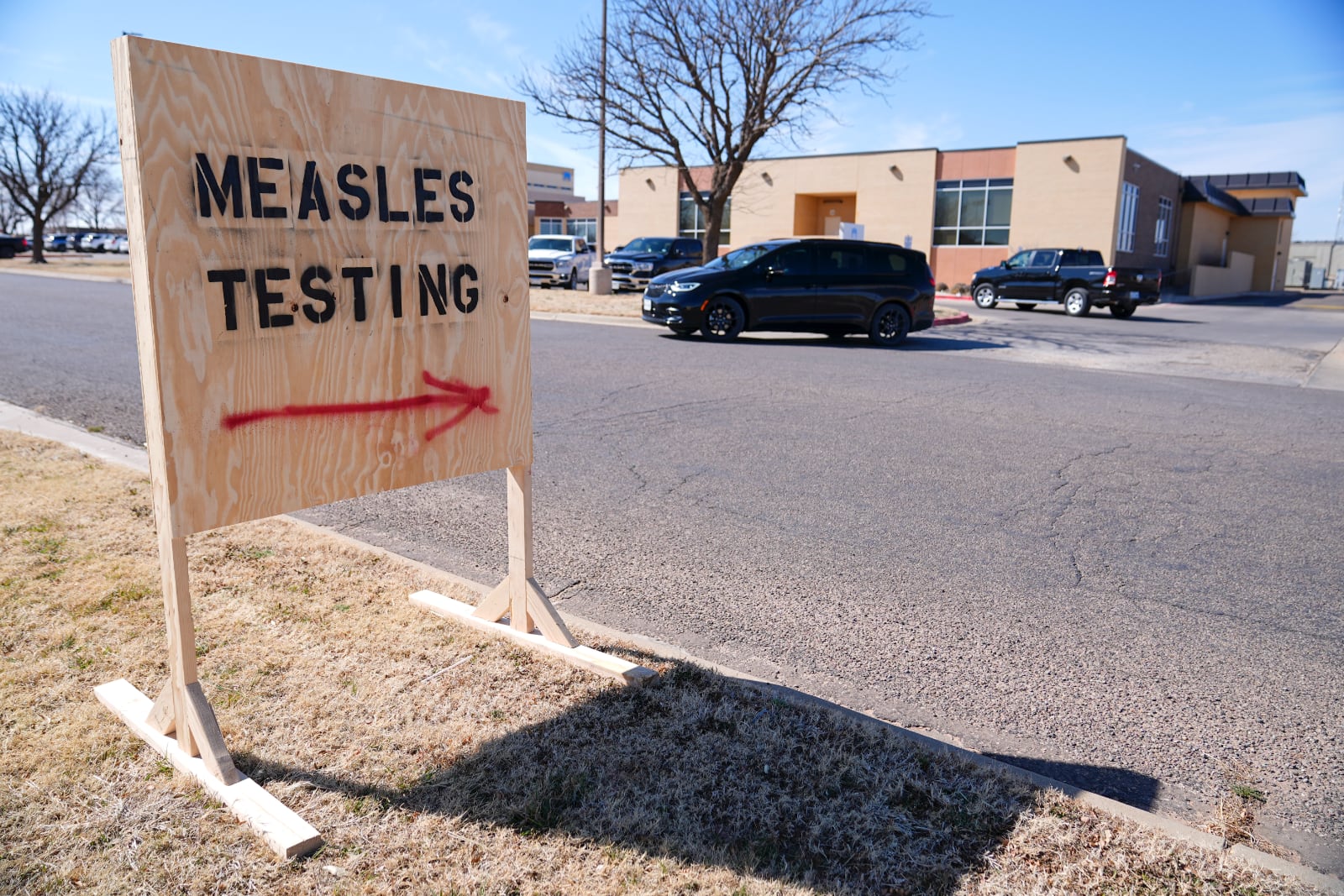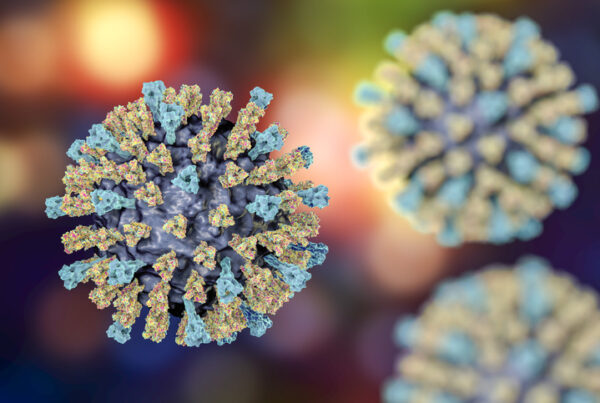Therissa Grefsrud still remembers the email. The COVID-19 pandemic had been raging for nearly a year, and a woman had reached out to ask about vaccines: Would they cause infertility in her or her future children?
Grefsrud, a nurse specialised in infection prevention, had heard such concerns before. But studies show no link between infertility and vaccination of any kind.
Still, Grefsrud exchanged messages with the woman as she shared her fears. Then she pointed her towards the facts.
“She came to me about a month later and let me know how grateful she was for me making this space without judgement,” Grefsrud said. The woman also shared that she was now vaccinated.
Fast forward four years, and Grefsrud is among the healthcare professionals in Texas confronting a new outbreak: measles.
The virus is one of the most contagious diseases on the planet. The United States Centers for Disease Control and Prevention (CDC) estimate that, if one person has it, they can infect nine out of 10 people in their vicinity.
Vaccination is the only way to prevent the disease, and experts like Grefsrud say empathetic conversations are necessary to raise awareness.
But they say rampant disinformation has made those kinds of conversations harder to come by.
“Public health officials aren’t skilled in information warfare,” said Jennifer Nuzzo, the director of Brown University’s Pandemic Center.
“They have to get people to understand the importance and value of getting vaccinated, but battling information warfare is not what we’re taught in public health school.”
A child’s death
Nuzzo calls the current outbreak “an utter tragedy”. Just 25 years ago, measles had been declared eliminated in the US, thanks to vaccination.
Now, more than 400 cases of measles have been confirmed in Texas alone between January and March, outstripping the total number recorded nationwide in 2024, which was only 285.
Forty of those infections have resulted in hospitalisations. One school-aged child in the city of Lubbock has even died — marking the first measles death anywhere in the US in a decade.
Experts warn that the Texas outbreak may have spawned more cases in nearby states too. Just this month, New Mexico reported a second measles-related death in Lea County, on the border with Texas.
Measles, while highly infectious, has a relatively low death rate. The CDC estimates that, for every 1,000 unvaccinated children who contract the virus, only one to three will die.
But that still meant hundreds of children perished each year before vaccination became widespread. Back then, as many as four million patients were infected each year. And survivors could suffer long-term complications, ranging from vision and hearing loss to brain damage.
Still, officials, including Health and Human Services Secretary Robert F Kennedy Jr, have been accused of downplaying the outbreak — and stirring fears of vaccination.
In a March 11 appearance on Fox News, Kennedy warned the vaccine to prevent measles could have deadly side effects, though it has been repeatedly proven to be safe.
“ There are adverse events from the vaccine. It does cause deaths every year,” Kennedy said. “It causes all the illnesses that measles itself causes.”
Instead, Kennedy promoted the use of vitamin A supplements, which do not prevent measles. Only vaccination can do that. He even suggested getting measles could itself be a line of defence.
“ It used to be, when you and I were kids, everybody got measles,” Kennedy, 71, said. “And the measles gave you lifetime protection against measles infection.”
A wave of ‘fringe’ bills
The measles outbreak in Texas arrives in the wake of a growing trend of anti-vaccine legislation.
Vaccination is required for attendance in Texas public schools. But in 2003, an amendment was passed that loosened the restrictions.
Previously, Texas parents could opt out of vaccination only for health or religious reasons. But the 2003 law created a new category for vaccine exemption: “reasons of conscience”.
Since then, Texas lawmakers have introduced a slew of bills that would make it easier for parents to opt out of shots like the vaccine for measles, mumps and rubella.
Just this year, dozens of laws have been proposed, including a bill to make exemption forms easier to access and another to restrict the state from collecting data about exemption requests. One bill would even strike vaccine requirements entirely.
The flood of laws reflects rising public scepticism. In Texas, the rate of vaccine exemptions has more than doubled in the last 10 years.
“These bills would’ve been fringe not that long ago,” Donna Howard, a nurse and lawmaker, told Al Jazeera.
Many of Texas’s anti-vaccine bills are sponsored by Republicans. Howard has been a Democrat in the state’s Republican-dominated legislature since 2006. For her, working across the aisle is not an option but a necessity.
“It’s building relationships, it’s building respect and trust, and it’s making an effort to find common ground,” Howard said. “Finding the common ground has become more difficult, but not impossible.”
Seeking ‘trusted messengers’
Part of the problem is perception. The measles vaccine has been around since 1963. Outbreaks have largely declined since.
As a result, Dr Philip Huang points out that most clinicians, himself included, have never even seen a case of measles.
Huang leads the Health and Human Services department for Dallas County, which is roughly 644 kilometres — or 400 miles — from the Mennonite community in West Texas where the current measles outbreak appears to have originated.
“We’re very engaged, even if we’re not in the middle of the heat of things,” Huang said.
He too stressed the importance of empathy and understanding in addressing vaccine scepticism.
Huang said he and his team are constantly on the lookout for “trusted messengers”: local church, business and community leaders who have the trust of their neighbours. They are best situated to cut through the noise with reliable, fact-based information about vaccines.
“We’re continuously trying to address some of the misinformation and disinformation,” Huang said, “but it’s still very difficult.”
Vickie Parker, a 72-year-old who grew up in San Antonio, Texas, has “worked in every single type of healthcare facility that you can imagine”.
But it was her experiences witnessing preventable diseases that helped teach her about the importance of vaccination.
One of her most traumatic childhood memories involves going to a livestock show in her hometown, where a young girl with polio was on display in an iron lung.
“She looked to be probably 12 or 13,” Parker said, “and the parade of people walked around this iron lung that had windows cut into it. You could look through those windows and see her little, bitty, skinny body, with her paralysed respiratory muscles.”
Since then, vaccination has nearly eradicated the poliovirus. But the image of the girl in the iron lung has stayed with Parker for decades.
She said it is impossible not to think about it when confronted by today’s rise in measles cases.
‘Spores of ignorance’
In her work at hospitals or in-home healthcare, Parker explained she has often talked to patients about the importance of vaccines. Some listen. Many don’t.
While Parker has seen plenty of misinformation and disinformation over the years, she said the COVID-19 pandemic made matters worse.
“There was a petri dish there just waiting for that mess to proliferate,” she said in reference to vaccine scepticism.
“And then the right wind came along, and it blew those spores all over the place: the spores of ignorance and misinformation.”
Rekha Lakshmanan observed something similar. She is the chief strategic officer for The Immunization Partnership, a Houston-based nonprofit that aims to eradicate preventable diseases.
She argued that Texas has long been a site of vaccine misinformation. But the pandemic “made the nation catch up with Texas”.
False rumours flooded the internet, warning that vaccines could alter DNA or render people infertile. Some conspiracy theories even posited that the vaccine could be used for implanting chips into patients’ bodies for surveillance.
Not all vaccine sceptics believe the misinformation. The way Lakshmanan sees it, vaccine hesitancy falls on a continuum. At the far end, there are those who cannot be convinced to get a vaccine, regardless of the data you present. Unfortunately, she said, that’s the loudest group.
Yet, others can be convinced.
“You have to take a step back and see that there’s a bigger part of that continuum that’s parents, and they just have questions,” Lakshmanan said.
She explained that parents are often sifting through reams of misinformation, trying to understand what is real and what isn’t.
For example, the anti-vaccine organisation Children’s Health Defense recently published a website that bore a striking resemblance to materials published by the CDC.
But its site was riddled with disinformation about vaccines. Kennedy, who served as a leader at Children’s Health Defense before joining the government, ultimately ordered the organisation to take the site down.
“The challenge with misinformation is that it could look legit,” Lakshmanan said, “which is why we have to approach these conversations with empathy.”
That includes arguments about “parents’ rights”, which she says is entirely misleading. Anti-vaccine leaders like Kennedy have accused the government of forcing vaccination on parents.
“No one has ever said we should take away parents’ rights,” Lakshmanan told Al Jazeera. “It’s a red herring.”
‘A stain on that legacy’
But at Brown University’s Pandemic Center, Nuzzo cautioned against viewing the current outbreak in Texas through a purely “political lens”.
She said there are pockets of under-vaccinated populations around the country, not just in Texas and Republican-led areas.
“This is an unfortunate source of vulnerability that exists throughout a lot of the United States,” Nuzzo explained.
She also pointed out that there is evidence that more families could be embracing vaccination in light of the recent outbreak.
“We are hearing that there’s high demand for measles vaccines in Texas right now,” she said, “to the point where they’re unable to keep it stocked in pharmacies.”
This demand comes amidst the massive job cuts Kennedy is making to the Health and Human Services Department, as well as the appointment of David Geier, a vaccine sceptic, to investigate the thoroughly debunked belief that vaccines cause autism.
The State of Maryland’s Board of Physicians previously reprimanded Geier for practising medicine without a licence.
Last week, the Food and Drug Administration’s lead vaccine regulator, Peter Marks, also resigned over what he considered “misinformation and lies” under Kennedy’s leadership. Kennedy, meanwhile, has framed himself as a “freedom of choice person”.
Against that backdrop, Nuzzo knows Texas and other states may be in for a long fight against measles. Some experts say the outbreak could last months, maybe even a year, despite the rise in vaccinations.
“There’s clearly more work to be done,” Nuzzo said. “The US has long been seen as something to emulate, and being now at the precipice of losing our measles elimination status is really a stain on that legacy.”



